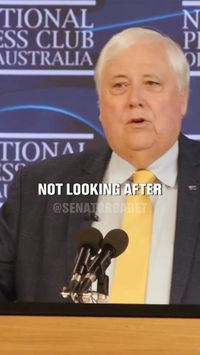Clive Palmer's new political initiative, the Trumpet of Patriots, is facing scrutiny not just for its platform but for its grammar. Lorraine Phillips from Wollongong expressed her concerns, stating, "Really? ‘Destucts our communities’? Perhaps this is the party for illiterates." The critical eye on Palmer's campaign highlights an interesting intersection of politics and language, where even minor slip-ups can fuel an entire debate on competency.
Kevin Hunt from Kenthurst added another layer to this conversation, questioning the accepted status of gold as a ‘safe haven’ investment. He stated, “Something that has always had me curious... is why is gold a ‘safe haven’? It has almost no intrinsic value apart from wedding rings, dental fillings and the bathroom fittings on oligarchs’ yachts, and therefore surely it is only worth what someone else is willing to pay for it. Why is it not like any other hyped-up investment bubble that could burst tomorrow if a whole bunch of people started thinking ‘yeah, nah’?” Hunt’s inquiry resonates with growing skepticism around traditional investments, particularly as their market values fluctuate dramatically.
Tim Ingall of Scottsdale, Arizona, shared a quirky yet poignant observation regarding wildlife interactions with traffic. He wrote, “I would like to add skunks to the comprehensive list of animals that don’t do well when chancing their lives crossing the road. I know they aren’t Australian, but the unique, pungent odour experienced as you drive by a dead skunk is memorable for all the wrong reasons.” Ingall's commentary on the skunk effectively elevates a mundane observation into a humorous, yet thought-provoking musing on the animal kingdom.
Meanwhile, Judy Jones from Thornleigh recalled a particularly hair-raising experience near Broken Hill, mentioning a “stupid” emu that had a death wish. “Our stupidest was outside Broken Hill, the second of a pair of emus, who – despite us bearing down on it – determinedly followed the first emu. Our choice was a road train coming towards us, a deep ditch off the road or the emu. The emu drew the short straw. Sorry, Emu but it was all about self-preservation.” Jones’ anecdote not only illustrates the often comedic aspects of animal behavior but also reflects on the unexpected dangers posed to wildlife by vehicles.
Agreeing with Jones, Janice Creenaune of Austinmer remarked, “all those feathers make such a sad display on the tarmac.” This shared sentiment reinforces the collective understanding of both the humor and sorrow attached to wildlife encounters on roads.
In another curious observation, Ian Nicholls from Baulkham Hills described a sudden change in his backyard. He reported, “The ants in our backyard have suddenly started to dig. Does that mean a lot of rain is coming?” Nicholls’ query taps into the old wives' tales surrounding animal behavior and weather predictions, showing how some people still hold onto traditional knowledge systems.
Lastly, Ian Clarke of Terrigal weighed in on the recent revival of the term “grok.” He praised its usage among people, stating, “FYI, the word Grok was coined by sci-fi writer Robert Heinlein for his book Stranger in a Strange Land; it was an alien concept of totally understanding another entity. To ‘Grok someone’ meant you knew them better than they knew themselves. Should be more of it. Grok on!” This commentary not only highlights the fluidity of language but also its power on social understanding and connection.
As various individuals share their observations and questions, it becomes clear that even seemingly mundane topics regarding grammar, wildlife, and investments can spark broader discussions about our world. In this digital age, where social media amplifies voices, these reflections resonate, forming a tapestry of opinion and curiosity.



